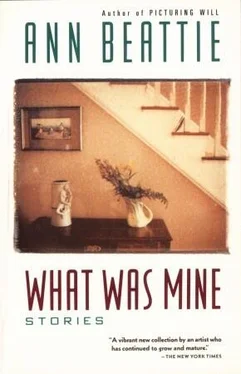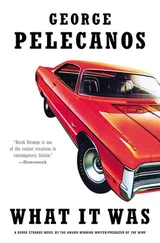Ann Beattie - What Was Mine
Здесь есть возможность читать онлайн «Ann Beattie - What Was Mine» весь текст электронной книги совершенно бесплатно (целиком полную версию без сокращений). В некоторых случаях можно слушать аудио, скачать через торрент в формате fb2 и присутствует краткое содержание. Год выпуска: 1992, Издательство: Vintage, Жанр: Современная проза, на английском языке. Описание произведения, (предисловие) а так же отзывы посетителей доступны на портале библиотеки ЛибКат.
- Название:What Was Mine
- Автор:
- Издательство:Vintage
- Жанр:
- Год:1992
- ISBN:нет данных
- Рейтинг книги:5 / 5. Голосов: 1
-
Избранное:Добавить в избранное
- Отзывы:
-
Ваша оценка:
- 100
- 1
- 2
- 3
- 4
- 5
What Was Mine: краткое содержание, описание и аннотация
Предлагаем к чтению аннотацию, описание, краткое содержание или предисловие (зависит от того, что написал сам автор книги «What Was Mine»). Если вы не нашли необходимую информацию о книге — напишите в комментариях, мы постараемся отыскать её.
What Was Mine — читать онлайн бесплатно полную книгу (весь текст) целиком
Ниже представлен текст книги, разбитый по страницам. Система сохранения места последней прочитанной страницы, позволяет с удобством читать онлайн бесплатно книгу «What Was Mine», без необходимости каждый раз заново искать на чём Вы остановились. Поставьте закладку, и сможете в любой момент перейти на страницу, на которой закончили чтение.
Интервал:
Закладка:
As she spoke, a man wearing a torn jacket and carrying a bottle wandered into the parking area. For a few moments he seemed shaky on his feet, and confused. Then he squinted at them in the car and took a few steps toward them. He stopped. He bent and made a sweeping motion with his arm. Then he straightened up and took a drink from the bottle, turned, and walked almost soberly out of the fenced-off parking area. He stood beside the door and waited while Stefan started the ignition, put the car in gear, and rolled out the gate. “It’s okay; he’s just a harmless drunk,” he said. Intent on not making eye contact with the drunk, he got out quickly, swung the gate closed, and padlocked it, keeping his head averted.
“You’re a lucky man,” the drunk said. His words came out clearly. So clearly that Stefan looked at him, surprised.
The drunk shrugged. “Nothing more I can tell you,” he said. Then he walked away, his head held a little too archly to convey the impression that he was really strutting off elegantly, yet still managing a convincing imitation of a sober man.
Stefan stood there, certain that the man would turn around. He would want money, or he would need, suddenly, to insult him. He might have a knife, and threaten him. He would certainly do something.
He did not. Instead, he turned the corner and disappeared. Stefan’s sudden calm wasn’t because of the man’s disappearance, though; it was because while he was focused on one problem, another problem had come into his mind and had been instantly solved.
When he got back in the car, he would simply kiss her. That was the most appropriate response to her story.
Late in the afternoon, in February, the phone rings. Francine is at a public phone, murmuring quietly in case anyone passing by might overhear. She has gotten the promotion. Much sooner than she expected, she was called into the boss’s office and commended for the presentations she had made that month. She had been responsible for nabbing one particularly lucrative new client. No doubt about it; the new client said point-blank that he had chosen them because of Francine’s powers of persuasion. She does a British accent when she whispers “pahs of p’suasion.” She giggles, and he hears a tap-tap-tap . Though she spends much of the day working on a computer, her Mont Blanc fountain pen is her good luck charm. She thinks with it in her hand, taps it when she is considering a new idea.
A double entendre? he wonders. Surely she also realizes that the phrase “powers of persuasion” has a sexual ring. But the tittering is all little-girl giggling. Her voice gets even quieter. “This is something I didn’t tell you,” she says. “They’ve given me a ten-thousand-dollar raise — well, a five-thousand-dollar bonus and a five-thousand-dollar raise, but if I stay on course, they’ll do the same next year. Stefan, I didn’t tell you that if I’d had to take the other job, it would have involved travel. Now I can stay right where I am and be well rewarded for doing it. Isn’t it the best luck? Sweetheart, aren’t you happy?”
“I’m very happy,” he says, more relieved than happy. She was going to travel? What would that have meant?
“What about getting a sitter so we can go out tonight to some expensive restaurant? I’ll buy us Dom Pérignon.”
Tap-tap-tap .
He has a thought. “What about doing something that’s fun?” he says. “You don’t want to sit around some restaurant for hours all dressed up, do you? I mean, if that’s what you want, I would certainly like to host the celebration. But I thought maybe the two of us could do something else …”
No more tapping of the pen.
“What did you have in mind?” she says cautiously.
“Nothing in particular, but let me think a minute. Let’s see if we can’t come up with something that might be amusing. Something a little more like childish good fun.”
“I suppose you’re going to say you want to go bowling,” she says.
“Jesus!” he says. “That’s perfect. Not bowling, of course, but what about going ice-skating? First we could have a bottle of Dom Pérignon, and then we could go ice-skating.”
“You’re putting me on.”
“Why not?” he says. “We’re always saying we don’t want to get stuck in roles. What do you say we go to that weird new bar that’s all glass and neon — the one we passed by this weekend, that you said looked super-hip. We’ll go there first and put down a bottle of champagne.”
“You want to go ice-skating?”
“I can lace your skates and look up your skirt,” he says.
She laughs. An I-don’t-care-if-I’m-overheard laugh. “Seriously?” she whispers.
“It wasn’t exactly back in the Stone Age when we used to have fun,” he says. “The softball team at your brother’s place in the Hamptons was only the summer before last. You were a fierce first baseman. You can skate, can’t you?”
More giggling. “We’ll see who can outskate whom,” she says.
“Yeah, well, after you’ve put away half a bottle of champagne, then we’ll see if your pronouns are so exact.”
“What’s gotten into you?” she says.
“I’m happy for you. I agree: we should celebrate. I’ll get a sitter and we can go out and skate until the place closes down.”
He hangs up and flips through a notepad on the counter. Then the thought comes to him that perhaps Julie could spend the night at Cassie’s house, where he dropped her off to play after school. Cassie’s mother was nice enough. What problem could it be to add one six-year-old girl to a house of four children for one night’s sleepover?
He calls, and Gennine says that of course Julie can stay. He has to promise that if she wants to come home in the middle of the night, though, he will drive there to pick her up. She absolutely refuses to drive children home in the middle of the night.
He speaks to Julie, who is delighted with the plan. She is out of breath, in a hurry to get back to whatever she was doing.
Gennine takes the phone back. She asks what time he will be by in the morning, or whether she should drive both girls to school. He says he will be happy to round them up and drive them; he’ll come at ten after eight.
“If my husband ever extended himself in the least with our children, I think I’d faint,” she says good-naturedly. “I’ll be happy to take you up on your offer. If you don’t mind, I’ll have all of them pile into your car tomorrow.”
“No boys!” Cassie shrieks in the background. “They have to take the bus to school, Mommy.”
“She’s as mean to her brothers as they are to her.” Gennine sighs. “How I envy you for having only one child. How we all envy you for the way you’ve worked things out.”
It surprises him that anyone has given thought to his and Francine’s division of responsibility. When he first met Gennine, he was amused because she was something of a flirt, but what she has just said makes him revise his opinion. Perhaps it wasn’t that, but an openness in expressing her admiration for them, conveyed in constant smiles rather than by words.
He tells himself silently, as he often does, that what makes Francine happy makes him happy. Because that is certainly the way it should be, and if he doesn’t let envy or misgivings creep in, if his own problems don’t get tangled up with hers, he can simply share in her happiness.
Feeling almost elated — though he has to fight the thought that his high spirits are because he’s sure he can outskate her, rather than because he’s happy she got the promotion — he puts on a jacket, starts the car, and backs out of the driveway, heading off toward the shopping center. He looks at the empty passenger’s seat and wonders if Julie’s absence is what is making him feel suddenly younger. He clicks a Ziggy Marley tape into the tape deck — something he bought on impulse a month or so before, remembering Bryant Heppelson’s love of reggae — and lets the music transport him back to New York, to a time when he really was much younger. He squints in the strong afternoon sunlight, imagining he is Bryant driving all those hours to Vermont to sing his heart out in a garage band. At a red light he closes his eyes and conjures up Vermont: the road winding above Bristol Falls, the Middlebury ski area; all that green, and blue skies. But just as quickly he realizes that he is picturing the few parts of Vermont he has seen; he doesn’t even know where in Vermont Bryant traveled to. In fact, he’s out of touch with Bryant, except for the annual Christmas card exchange. Bryant and his wife moved to Connecticut the year before. Too much crime and unhappiness in the city to raise children there, he wrote on the card. In the picture he enclosed, Melly looked much the same, though she was flanked by two towheaded boys, three and four. Who could say where that hair came from, with Bryant’s brown hair and Melly’s hair its natural auburn, instead of the pale blond she used to dye it. The photograph had fluttered out of the card and landed on the rug, face up, and Francine had snatched it up as if it were some secret, then looked at it, puzzled, and said: “Oh yes. Of course. Of course they had a second child …” Then she had put the picture to her lips and kissed it.
Читать дальшеИнтервал:
Закладка:
Похожие книги на «What Was Mine»
Представляем Вашему вниманию похожие книги на «What Was Mine» списком для выбора. Мы отобрали схожую по названию и смыслу литературу в надежде предоставить читателям больше вариантов отыскать новые, интересные, ещё непрочитанные произведения.
Обсуждение, отзывы о книге «What Was Mine» и просто собственные мнения читателей. Оставьте ваши комментарии, напишите, что Вы думаете о произведении, его смысле или главных героях. Укажите что конкретно понравилось, а что нет, и почему Вы так считаете.












